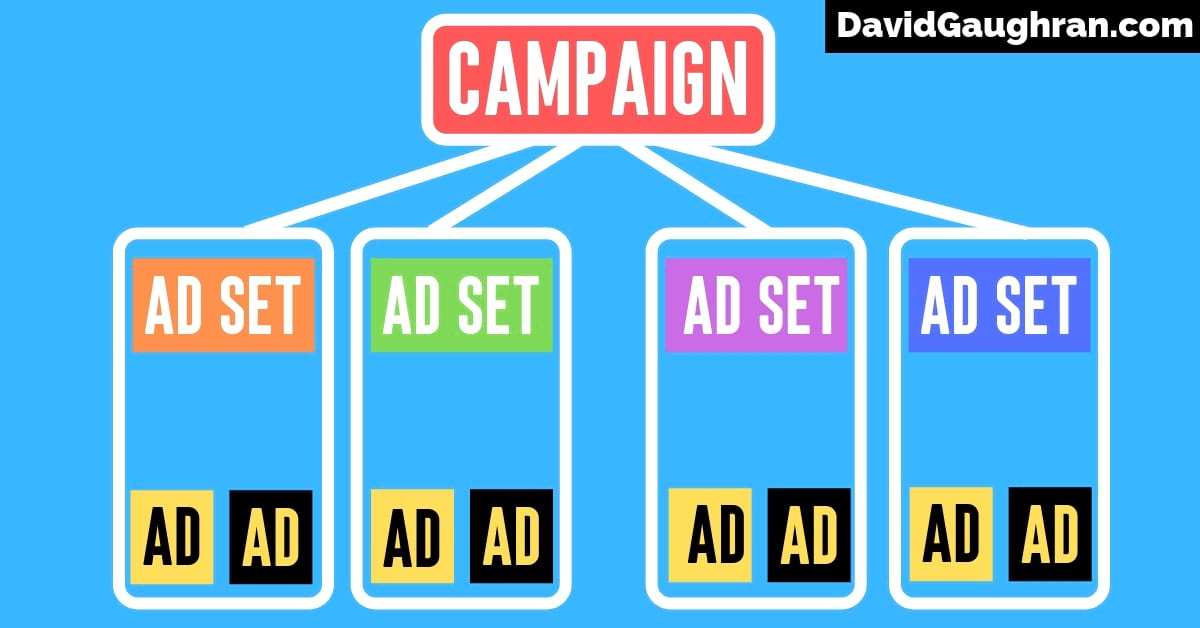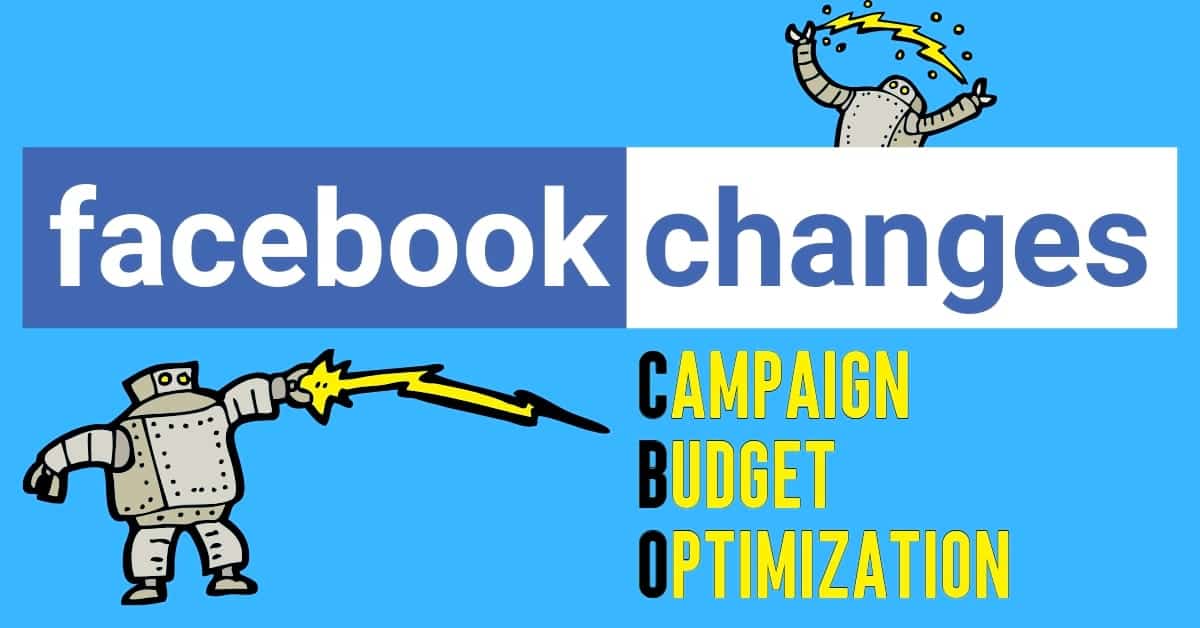There is a big change coming to Facebook Ads which could have a profound effect on the performance of all new and existing campaigns from next month onward. You need to start getting your head around this now as the change is quite unpopular and the workarounds are all a bit… fiddly.
The new feature Facebook is rolling out is called Campaign Budget Optimization. You might have seen it in your account already. It’s billed as a quality-of-life improvement, allowing you to simply nominate a budget for the campaign – and then hand the reins over to Facebook’s friendly neighborhood AI, which will determine how it should be spent. And if you like the sound of that, you trust Facebook’s system a lot more than me.
Campaign Budget Optimization has been available as an optional feature for several months now so lots of people have been experimenting with it and sharing data – which we’ll get to. The big change is this: from next month, it will start being compulsory.*
*Note: see the update at the bottom of the post. It appears this change will only start being compulsory next month for some users and others may be spared for a few months. Read on for more!
To explain why this is such a big deal, and why it will particularly affect authors, first we must quickly go over the basic structure of a Facebook campaign and how things work right now (experienced users can skip to the next section).
Facebook Ads – Campaign Structure
Facebook Ads have a three-level structure, much like Google Ads: Campaigns, Ads Sets, and the Ads themselves. The last level is the only thing that users see, and the other two levels are basically settings behind the curtain for advertisers, if you like. It breaks down like this:

The Campaign level is all about what kind of ad it is: Traffic (this is what you select when running a bog standard ad to your Amazon listing, for example), Leadgen (designed to boost your mailing list), or other types of ads like Awareness, and Video Views.
The Ad Set level is where you fiddle with all the primary settings for your ads like budget (how much you are spending), schedule, audience (who sees them), and placement (where your ads turn up).
The Ad level is the public face: the image, the link you are sending people to, the accompanying ad text.
Taking the picture above as our example, I might have a Campaign pushing a new release on Amazon, and then I might have one Ad Set targeting my mailing list, another targeting those who have Liked my Facebook Page, a third hitting a bunch of comp authors, and a fourth re-targeting anyone who has visited my website in the last six months. And then I might have two alternate Ad images inside each of those Ad Sets to see which my readers respond to best. That’s not the only way to structure a campaign, of course, but a fairly common one.
Facebook Ads – What’s Changing?
As you have just seen, budgets are currently set at the Ad Set level. But soon you will only be able to set budgets the Campaign level. Why is this change being made? And what difference does it make?
Facebook is deploying more and more machine learning these days, aiming to simplify the platform to draw in more advertisers and to also cut through some of the ever-growing complexity around Facebook Ads. Or if you want to be a little less kind, they are dumbing down the system… whether you like it or not.
You can already see this machine learning being deployed with split tests – either the formal Facebook feature which runs split tests for you, or the more manual ones you can just run yourself (i.e. like the example above where you put two alternate images in the same Ad Set). If you have done any split tests like this on Facebook, you will have seen the system actively monitor the results and give priority to the better performing ad out of the pair without you having to do that proactively.
Now Facebook wants to do that with budgets. And it’s more than a little controversial.
Instead of setting your budget at the Ad Set level, and assigning a separate budget of your choice for each of those Ad Sets, you will now set your budget at the Campaign level and the system will decide how to split it among your ad sets, based on performance.
In fact, you already have this option. What’s controversial is that from September this will start becoming compulsory.
The reason that experienced Facebook advertisers are unhappy with this change is twofold:
- It removes control. We know what budgets we want to spend where and don’t need “help.” Particularly because…
- To be blunt, the system isn’t as smart as billed. And doesn’t have a rather crucial bit of context: knowledge of your particular business needs.
Facebook Changes – Case Studies
Let’s say I’m a Kindle Unlimited author running a Countdown Deal on Amazon UK and Amazon US, and I want to spend $30 a day in the UK on my Facebook Ads, and $120 a day in the US, pushing both deals over the full seven days. Under the current systems, I can assign the respective budgets exactly like that and don’t have to worry about it further.
Under the new system, if Facebook sees that my UK ads are performing better – for example if they have a 4.2% CTR versus a 2.6% CTR on my US ads – it might start spending the majority of my budget in the UK. But I don’t want to do that because Kindle Store visibility is worth much more in the far larger market of America.
Another example should underline the problem.
Suppose I’m a wide author of bestselling military romances (a gal can dream…). With the current system, I can have one Ad Set targeting Amazon US, pushing my permafree Book 1, chewing through a $40 a day budget. And then have three more ads targeting American users of Apple Books, Nook, and Kobo with budgets of $5-$10 a day.
Again, I don’t want to spend more than $10 a day targeting Nook readers, or less than $40 a day targeting Amazon customers, because a sale on Amazon is simply worth more to me, as visibility in the much larger Amazon store is more valuable by several factors.
But Facebook’s new system might see the more deal-starved Nook reader responding with slightly more engagement on those ads and start shifting over some of that Amazon budget. This could cause me to fall off the front page of the charts on Amazon, and have a real knock-on effect on overall income, and Nook simply can’t make up the shortfall.
The point is that I know my business and my priorities. Facebook doesn’t – and can’t know that, no matter how many billions of calculations its AI can make on the fly.
There are further issues. One huge one: Facebook’s system is a notoriously slow starter. It can take four or five days to really click into gear and start making the right decisions – which makes it tricky to use for launches or other time limited promos.
The system can also make decisions a little too hastily, in my experience. A long-standing rule-of-thumb for as long as I’ve been working in digital advertising – so at least fifteen years – is that you can’t really judge an ad until it has accrued 1,000 impressions.
Facebook obviously didn’t get the memo because I’ve seen ads get ditched by the system after as little as 200 impressions – which is calling things way too quickly.
This is a real problem because day-to-day results can be quite variable, particularly if you’re talking about the smaller budgets and audiences that authors typically work with. And that goes double for any limited-time promos where you don’t have the luxury of waiting for the system get its sea legs.
What can you do?
Workarounds/Solutions
Even though the change doesn’t fully kick in for a while, I recommend getting ahead of it – because there are potential solutions to all these issues, but they are all quite fiddly. You will have to experiment to see which is best for your own workflow.
Options include:
- Setting Automated Rules for each Ad Set to nudge the system back on track. (More on Automated Rules from Facebook).
- Implementing max/min budgets for each Ad Set as appropriate. (Just note that Facebook advises against doing this unless you are experiencing extreme imbalance.)
- Creating separate Campaigns for each Ad Set where you want to absolutely control the budget.
All these approaches have more or less the same goal – grabbing back that control of budget and making sure the right amount of money flows to each Ad Set. I’ve mostly been doing (3) so far, and plan to experiment a touch more with (1) or (2), because splitting everything up by Campaign is not really ideal (for example, it can create issues with audience overlap, ad fatigue, and frequency – possibly issues with bidding against yourself also). But the other approaches aren’t problem-free either.
Whatever approach you ultimately opt for, you should be able to steer things at least somewhat as intended, even if all this does create an extra layer of busywork. Which is quite ironic given that the change is intended to reduce busywork, but that’s tech for ya.
Further Facebook Ads Resources
Some resources to help you handle all this:
- Facebook’s Help Page on the topic. Even for Facebook, this page is surprisingly thin on the ground and doesn’t mention any of the negatives, let alone workarounds. But it’s always good to check the official material first – even just to see how they discuss the feature.
- Jon Loomer’s peerless blog (best for more advanced users). My go-to resource for all things Facebook. One caveat: as with all general digital marketing sources, you have to translate the advice into something that will work for publishing and books. Just keep that in mind.
- Ad Espresso’s house blog (also for more advanced users). This is a popular Facebook & Google ad management tool which I can’t give you the skinny on as I’ve never properly tried it – but I know it has its fans. I have been on their mailing list for some time now, and they share some great data for free. Same caveat as above though. Also note other ad venues are covered by them too, but Facebook is their real area of expertise.
- Me! My weekly newsletter covers all ad platforms in depth. We are up to Episode 9 or 10 in my free series on Facebook Ads (I’d peg it as better for beginner/intermediate users but we’re getting more advanced as we go along…). Sign up here to join the fun and get access to all previous episodes gratis. No catch, other than the occasional off-color joke. And when I say occasional…
What do you think? Will you be negatively affected by this change? Or do you think it could streamline the Facebook Ads experience?
Update: I’m reliably informed that compulsory Campaign Budget Optimization may be postponed until as late as February 2020 for some users. The process of switching accounts over to compulsory Campaign Budget Optimization being next month, as I said, but it appears that Facebook will first focus on those accounts which have been using it a lot. I’ll update this note if I get further clarification, but, either way, I strongly recommend experimenting with this now so you don’t get ambushed.

